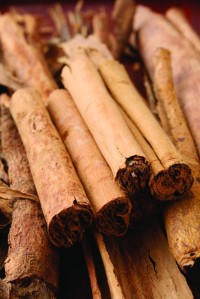Cassia comes from a tree grown in China where it has long been used in Chinese herbal medicine. The tree is closely related to the cinnamon tree, and often, the cinnamon that you buy in the store is actually cassia. The essential oil has a very similar scent to cinnamon, though it is not as strong or intense. doTERRA’s Cassia essential oil is distilled from the twigs and bark of the cassia tree.
Cassia has several well known uses including aiding in the relief of arthritis pain. However, it is usually more well known for it’s usefulness with digestive issues such as diarrhea and constipation. Simply adding a few drops to warm water along with a bit of sweetener such as Stevia or a fresh local honey is all it takes to help calm the belly. Cassia is also wonderful when you have a cold for flu by diffusing it in the air. On a completely un-medical like usage, I think the smell of Cassia on a cold winter day diffused in the air would make a warm and inviting scent for when you are expecting company, or just want a delicious scent in the air.
Interesting and noteworthy, in 2009, a report in the Pennington Nutrition Series:
“found the potential use of cassia bark oil to treat type 2 diabetes. Cassia cinnamon extracts had significant anti-diabetic effects in both animal trials and in human trials using people with type 2 diabetes. Not only were serum glucose levels reduced for people given cassia, but their total cholesterol, trigycerdies, and LDL cholesterol levels also decreased”. (Get to Know Cassia Oil, doterrablog.com)
As with cinnamon, cassia can be considered one of the “hotter” oils and can become irritating to the skin. Dilution with Fractionated coconut oil or another carrier oil is recommended especially for those with sensitive skin, and young children.
REFERENCE
Disclaimer: I am not a doctor and the statements on this blog have not been evaluated by the FDA. Any products mentioned are not intended to diagnose, treat, cure, or prevent any disease.